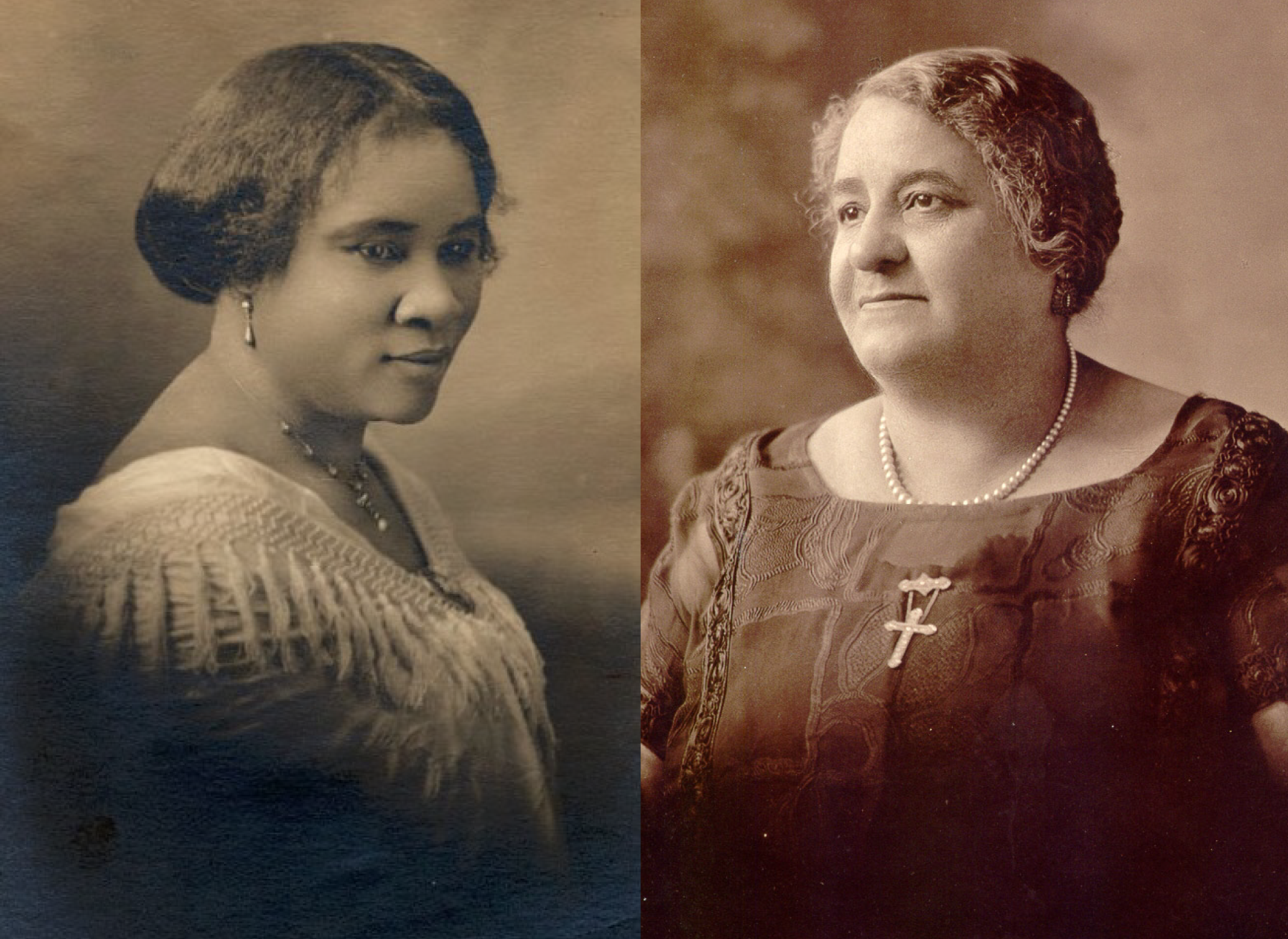Madam C.J. Walker and Maggie Lena Walker had a few things in common: they shared their last name (although weren’t related), they both were daughters of parents who had been enslaved, and both were determined to improve their lives and the lives of their communities through the businesses they founded.
In celebration of Black History month, let’s talk about these businesswomen’s service to their communities and their stories of success.
Madam C.J. Walker
Madame C.J. Walker was a visionary businesswoman and the first Black woman millionaire in America. She was born in Louisiana in 1867, the daughter of two former slaves. Madame Walker was orphaned at the age of 7, married at 14, became a mother at 18, and was widowed at 20.
As adversity leads to prosperity, Madame Walker transformed her setbacks into opportunities.
Around the time that she lost her husband, Madame Walker began to suffer from a form of baldness known as alopecia. In her search for a treatment for alopecia, she identified a business opportunity. Madame Walker set up a small factory in her kitchen, determined to create her own hair products specifically designed to treat black hair. In that small kitchen, she founded an empire.
Madame Walker’s products included scalp preparation, lotions, and iron combos. Together the products were known as the “Walker system” and they were very successful. Madame Walker believed that her business was bigger than hair care because it improved the overall well-being of Black women.
One reason for Madame Walker’s success is that she found a market that was underserved and catered to it using a personal approach. She hired Black women as “beauty culturalists”, sellers that helped distribute her products in a personalized manner.
Madame Walker employed Black women because she believed in their talents and skills. She encouraged them to give back to their communities, and she led by example. Madame Walker donated a significant part of her profits to benefit her community. She funded scholarships for women at the Tuskegee Institute and donated to many other organizations including the NAACP, the Black YMCA.
What Entrepreneurs Can Learn from Madam C.J. Walker
Stay close to your market: Madame Walker was a Black woman that benefited from her own product and hired Black women to sell her hair-care products directly to their neighbors and friends. By choosing salespeople from her products’ target market, Madame Walker ensured that her sales force truly knew the products and the women who made up her market. Her employees gathered insights from the market that were immediate, valuable, and actionable.
Promote the common good: Madame Walker encouraged employees to serve their community and rewarded them for it. She understood the daily struggles of the community and, in addition to making monetary donations, she advocated for generosity by her employees.
Maggie Lena Walker
Maggie Lena Walker was born in Virginia on July 15, 1864. Her mother was a former slave and her father an immigrant from Ireland. She attended a Black school in the deeply segregated South and graduated in 1883, having been trained as a teacher. When Walker married in 1886, she was forced to leave her teaching job because married women were not allowed to teach. After she left the classroom, Walker raised two children and dedicated her time and talents to the Independent Order of St. Luke, an organization dedicated to promoting Black economic independence.
Ms. Walker became the grand secretary of the Order of St. Luke in 1899. When she started her term as grand secretary, she took on a big challenge because the organization was close to bankruptcy. She was determined to save the Order, and she did it incredibly well.
In 1902 she founded the St. Luke’s Herald to bring news of the organization, keep the community informed, and help with their educational work. Then, she opened the St. Luke Penny Savings Bank and served as the president. She became the first woman bank president.
This bank was one of only six Black-owned banks in Richmond before 1920. Walker’s purpose was simple: she wanted her community to be informed on financial matters and to have a financial institution that treated them fairly. More often than not at that time Blacks either were not served at banks or were treated unfairly, for instance by being charged higher rates on loans than their white peers.
Ms. Walker kept the bank on a steady footing by maintaining reserves of cash. At the height of the Great Depression, when many US banks were failing, Ms. Walker merged the St. Luke’s with two other banks. The financial institution that resulted from the merger not only survived the Great Depression but is still active today.
Ms. Walker understood the financial hardships of life and the importance of saving money. She promoted a penny-saving program by giving children penny banks to save their coins. Once the children collected one dollar, they could open an account in the St. Luke Penny Savings Bank. This program benefited the children, as they learned a life-long valuable lesson and had savings, and also the bank, as it got money deposits.
What Entrepreneurs Can Learn from Maggie Lena Walker
Care about the community as a whole: a business cannot operate isolated from the world, and helping the community where your business is located is not only philanthropic but smart. Give back to the community in a way that makes sense to you and your business.
Keep in mind investing in themselves for a secure future: savings are fundamental. On a personal level savings can help you when an emergency comes up (car or home repairs, illness, etc.). As an entrepreneur, cash on hand can keep the business afloat during trying times. Ms. Walker taught that everyone should save in the present for a secure future.
Bottom Line
Do you know any other interesting facts about these incredible women? Please let me know below or reach out to me via Twitter. For more of my thoughts on investing your time and money, please visit my company’s website, LexION Capital.
Elle Kaplan is the founder and CEO of LexION Capital, a fiduciary wealth management and woman-owned business firm in New York City serving everyone who feels left out by traditional “Wall Street”, including women and the families they love.











